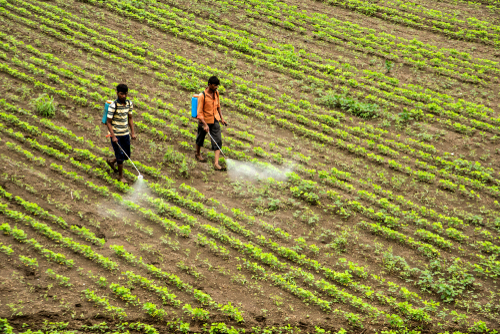


Pollution Sensors: A Tool for Collaboration Between Citizens and Public Authorities?
3 July 2020
When Economists Study Politics in Developing Countries
3 July 2020by Jean-Noël Jouzel, CSO*
Jean-Noël Jouzel, a CNRS researcher at the Center for the sociology of organisations (CSO), focuses on controversies related to health issues. He is interested in pesticides and the recognition of their effects on the health of farmers and local residents. He published Pesticides. Comment ignorer ce que l’on sait [Pesticides. How to ignore what we know] (Presses de Sciences Po, 2019). Presentation.
Five years after the International Agency for Research on Cancer classified glyphosate as a probable carcinogen, the controversies surrounding this substance are still raging.
Limited but consistent scientific evidence has shown the carcinogenic effects of glyphosate on the health of farmers who apply treatment products containing this active ingredient. However, both the industry marketing it and the public agencies assessing its risks claim that the harmful effects of these products are under control.
Good Practices Dictated by Protection Policies
Beyond the case of glyphosate, this controversy illustrates conflicts around the protection of agricultural workers exposed to pesticides. These products, which are by definition toxic, have long been the target of public policies seeking to protect the health of exposed human populations – especially agricultural workers, who are by far the most affected. Since the middle of the last century, in both the United States and Europe, these policies have taken the form of an administrative authorization to put the product on the market, granted on the basis of a regulatory risk assessment. The latter establishes an acceptable dose of exposure for each pesticide and sets the conditions of use to ensure that this dose will not be exceeded when the products are applied to fields.
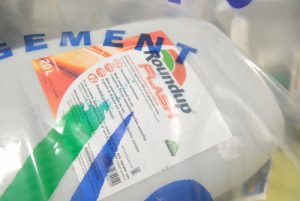
Recycling drums plastic of phytosanitary agricultural product. © Photoagriculture, Shutterstock
Based on the idea that farmers can use pesticides safely if they are properly informed about the products’ dangers and “good practices” to protect themselves, these “controlled use” policies for pesticides rely on the dissemination of health recommendations to farm workers through product labels, such as the wearing of protective gear and gloves. However, in recent decades, epidemiological investigations have challenged this idea, highlighting the over-incidence of certain chronic diseases among farmers exposed to pesticides. These studies show an increased risk of Parkinson’s disease, prostate cancer, and hematological malignancies. While this data is still being collected, it already highlights the shortcomings of controlled use policies.
A Convergence of Views Between Industry and Agencies
However, the controlled use rhetoric remains central to the rhetoric of justification surrounding the massive use of pesticides in agriculture, as the glyphosate case has shown.
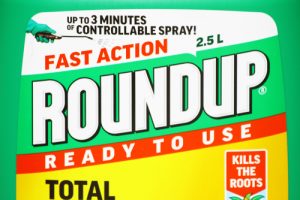
© Litepix, Shutterstock
In marketing Roundup, the world’s best-selling herbicide containing glyphosate, Monsanto stated, following the classification of this substance as a probable carcinogen, that the pesticide had “a long history of controlled use. Worldwide, experts evaluating it over the past four decades have overwhelmingly concluded that glyphosate, when used according to label directions, does not pose an unreasonable risk of harm to human populations” (Monsanto, “IARC’s report on glyphosate,” 21 April 2017). Pesticide risk assessment agencies around the world have more or less aligned themselves with this opinion, such as the Australian agency: “our position is that all marketed products containing glyphosate are safe when used according to label instructions” (Australian Pesticides and Veterinary Medicines Authority, 3 August 2017).
The Transatlantic Circulation of a Public Policy Myth
This industrial and institutional belief in the potentially controlled use of pesticides has thus resisted the accumulation of conflicting epidemiological data. This is because it is rooted in a long history of constantly intersecting politics, economics, and science that has built and consolidated justifications for the massive use of pesticides in agriculture. Born in the 1950s in the United States, a crucible of agricultural productivity and intense pesticide use, regulatory methods to determine occupational exposure to pesticides started spreading to European countries in the 1980s.
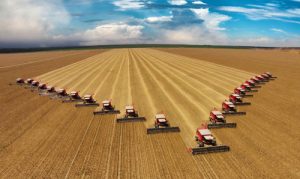
Soybean harvest in Mato Grosso state © Kelvin Helen Haboski, Shutterstock
This international dissemination of the measurement of agricultural labor force contamination took place agricultural commodity flows were increasingly globalizing. In fact, the existence of domestic particularities in pesticide risk assessment was considered detrimental to competitiveness. This led to a dynamic of harmonization: despite national variations, all the agencies assessing the risks of pesticides agree on a fundamental principle, whereby the regulatory estimate of occupational exposure to pesticides is solely based on data collected from farmers complying with the good practices mentioned on the labels of the tested products.
Workers’ Double Jeopardy
The problem lies in the fact that these good practices appear to be fairly removed from the reality of agricultural working conditions. This is evident in data collected by epidemiologists and ergonomists alike, underscoring the difficulty for farmers to systematically comply with the health recommendations meant to protect them. The data should logically lead risk assessment agencies to revise their methods of estimating farmers’ exposure to pesticides, and to base the estimate on data collected under conditions that are more representative of real work situations.
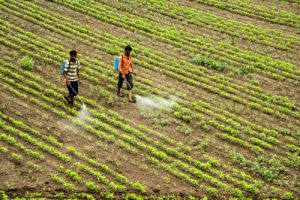
Vaporisation of pesticides In soy fields in India© CRS PHOTO, Shutterstock
However, the cost of such a revision appears prohibitive, since it would inevitably reopen the long settled debates that led to the standardization of exposure measurement. It would also call into question the entire epistemic infrastructure of risk assessment. The result is a status quo that comes at the cost of farmers: the use of pesticides puts their health at risk, and an approach based on actual practices might result in their being held responsible for their suffering. Their inability to scrupulously comply with label instructions describing good agricultural practices is cast as negligent by industrial and institutional risk assessment players.
This is the price of standardizing pesticide risk assessment – a pillar of the trans-nationalization of agricultural product flows.
Translated by Carolyn Avery
Jean-Noël Jouzel, a CNRS researcher at the Center for the Sociology of Organisations, works on controversies linked to environmental health issues. His work focuses in particular on the causes of the lack of knowledge about occupational diseases caused by workers’ exposure to toxic products. He contributes to the currently growing field of research on the social construction of ignorance.
Jean-Noël Jouzel – Pesticides. Comment ignorer ce que l’on sait , Presses de Sciences po, 2019
Jean-Noël Jouzel – Pesticides and human health: between toxicology and epidemiology, Cogito, 2018

